Statement
Message by UNFPA Executive Director Dr. Natalia Kanem at the Executive Board
04 September 2018Statement by Dr. Natalia Kanem, Executive Director of UNFPA, at the Executive Board of UNDP, UNFPA and UNOPS Second Regular Session 2018 on 4 September in New York.
Before I begin my remarks, I would like to acknowledge the loss of two dear colleagues in recent months. Mr. Kido Seong, who passed away on 15 August following an accident, had been working since April in the Population and Development Branch in Technical Division as secondee from Statistics Korea (KOSTAT) and was supporting our work on ageing and on census. In June, we mourned the loss of Dr. Jorge Parra, who joined UNFPA from his native Peru in 2005, serving as our Representative in Bolivia, Ecuador and most recently in Colombia. On behalf of all of us at UNFPA, I extend our heartfelt condolences to the families and friends of Kido Seong and Jorge Parra, as well as to the Governments of the Republic of Korea and Peru. They will be greatly missed and fondly remembered by all of us who knew and had the pleasure of working with them.
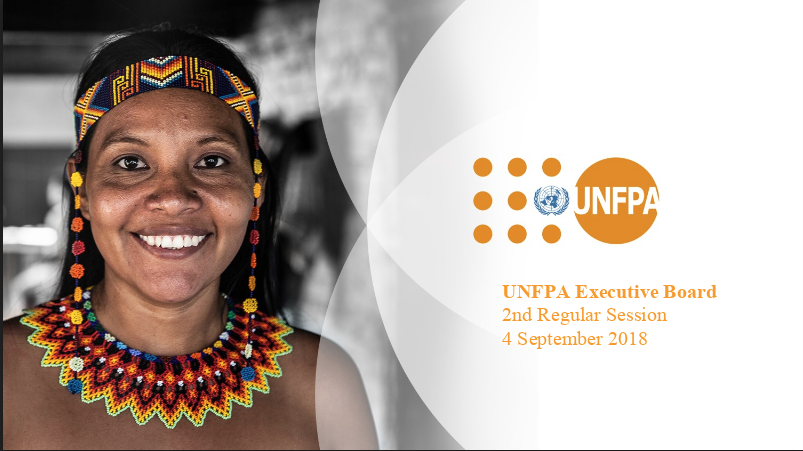
Madam President,
Distinguished Members of the Executive Board,
Colleagues and friends,
Ladies and gentlemen,
Good morning! I am pleased to be here with you for this Second Regular Session of the Executive Board.
This is an important moment for UNFPA. Next year we celebrate the 25th anniversary of the landmark International Conference on Population and Development, ICPD. The regional review process is already under way. A few weeks ago, I attended the Third Regional Conference on Population and Development for Latin America and the Caribbean in Lima, Peru – the first in a series of important regional review meetings to be held between now and November.
As I begin I will pose two questions that I hope you will think about during our session this morning: First, what does ICPD mean to you and to the women and girls in your country? Second, what should ICPD mean for the next generation, for the 10-year-old girl today who is poised at the threshold of her adolescence?
We will also celebrate UNFPA@50 next year. These two historic milestones offer an opportunity for all of us to reflect on the world’s progress towards ensuring rights and choices for all, to recommit to the vision of Cairo and to redouble our efforts to reach those still left behind 25 years later.
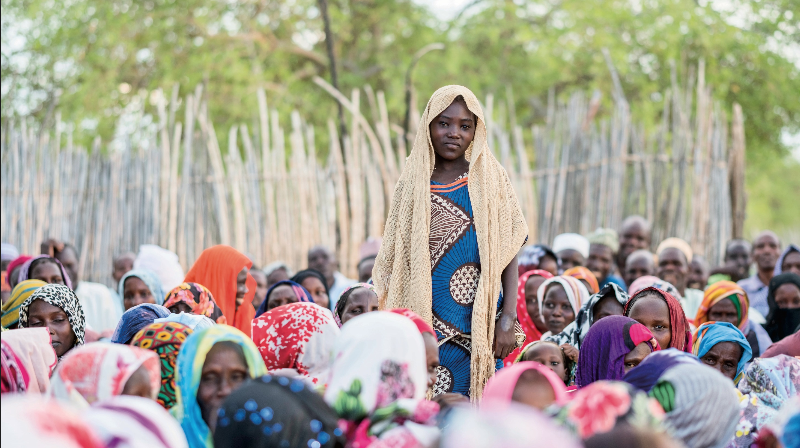
The coming months are also pivotal ones for the UN system, as we begin to implement General Assembly resolution 72/279 on repositioning the United Nations development system to deliver on the 2030 Agenda.
The challenges we face are considerable. So too is the scale of our collective determination and the commensurate opportunities to drive transformative change.
This determination and ambition guides us at UNFPA. We have committed to universal access to sexual and reproductive health and reproductive rights by 2030, driven by three transformative results: to end unmet need for family planning, to end preventable maternal death, and zero gender-based violence and all harmful practices against women and girls.
These aims are supported by a commitment to “ending invisibility” through high-quality population data. This includes ensuring that all people are counted in the 2020 upcoming census round, and we are ramping up our preparations for this key census year and those that surround it.
As I reflect on the nearly one year during which I have been honoured to serve as Executive Director of UNFPA, I would like to thank the Board once again for your support and guidance to me personally and for your expertise in shepherding UNFPA through a turbulent, yet transformational period. We have weathered some rough storms together, and together, I believe we have come out strong, more capable, more ready, willing and able.
We are determined. We know that a 10-year-old girl is waiting. We see the possibility of transforming her world and the world of every young person every day in our work in communities around the globe…
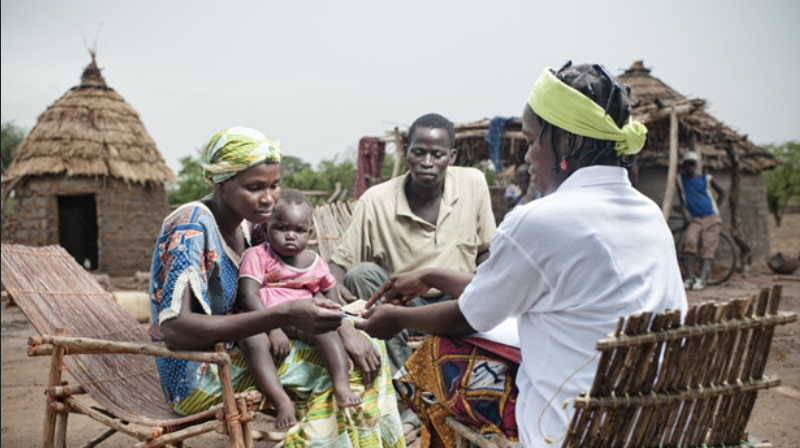
We see a world where every woman and adolescent girl can make her own choices about whether or when to become pregnant. The evidence shows that access to modern contraception prevents abortion, prevents death and prevents disability.
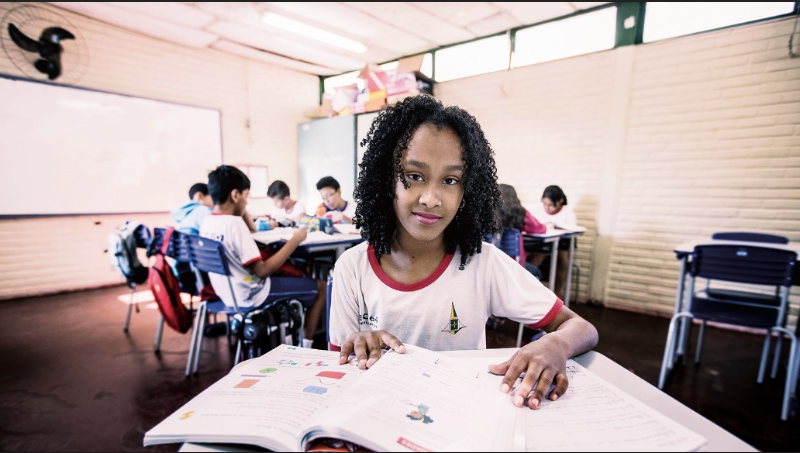
And because she can make her own choices, she can stay in school and out of child marriage.
That is the power of choice.
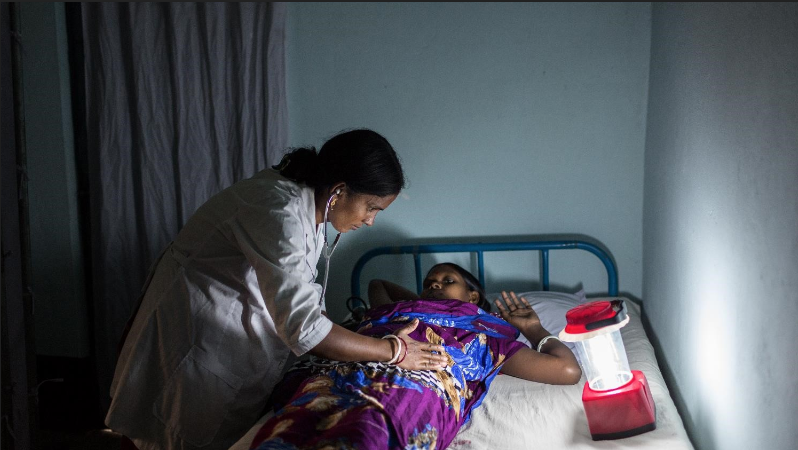
We envision a world where no woman or adolescent girl loses her life while giving life.
Where every childbirth is safe – everywhere.
Even here…
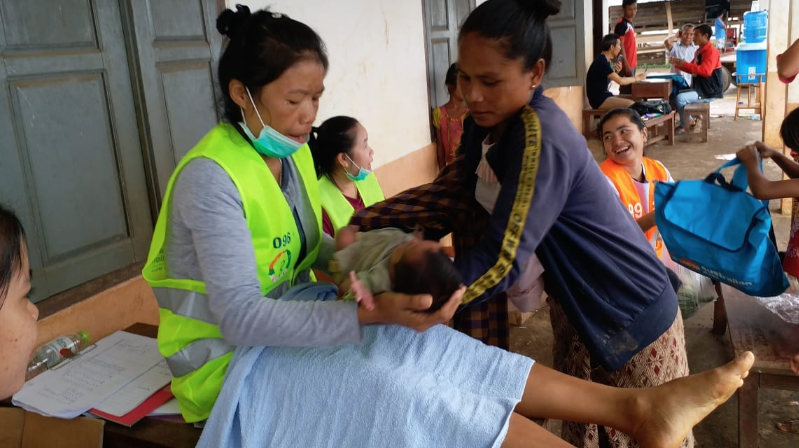
In a village in Laos completely cut off by floods, this baby was delivered safely using a UNFPA clean delivery kit. Mother and baby continue healthy.
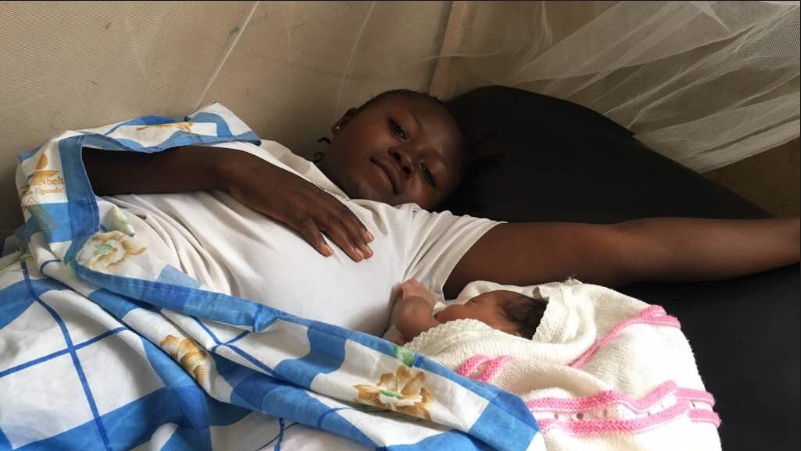
And here in Mangina, epicenter of a recent Ebola outbreak in the Democratic Republic of Congo… UNFPA was there to ensure safe births, even while working with our partners to prevent and control infection, and to raise awareness among local communities about the risk of Ebola.
Every day, we see the possibility of a world where every young person has access to comprehensive sexuality education.
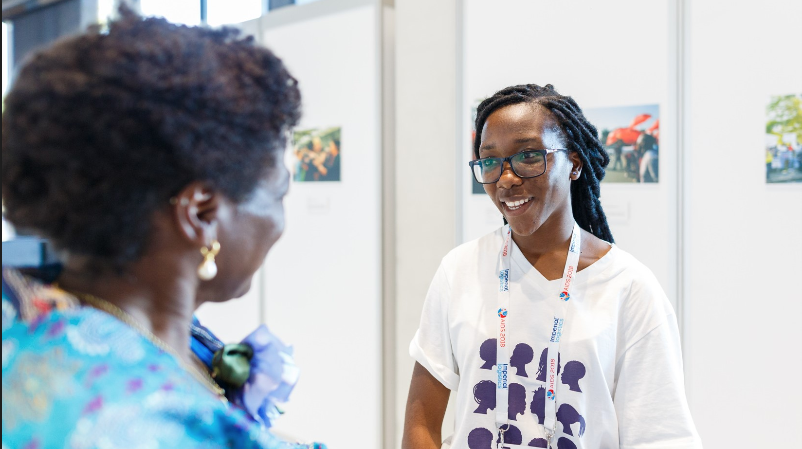
Like Zoe, a youth leader I met recently. She wants age-appropriate information that is real and relevant to young people’s lives and needs. We at UNFPA want that, too, and we are committed to working with and for young people like Zoe to ensure that they receive this.
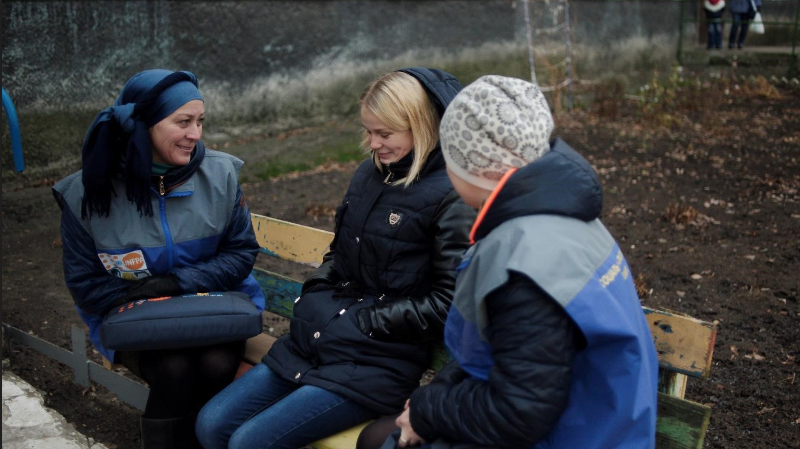
We see the possibility of a world where every woman and girl can live free from sexual abuse and violence. And we are working with our partners, including through the European Union Spotlight Initiative, to bring a decisive end to violence against women and girls.
That is the world we all want to live in. We know how to make that world a reality. We have the data, the evidence and the hard lessons learned. We know the scale of the investments needed, the challenges we need to address together, and the partnerships we need to build to get there.
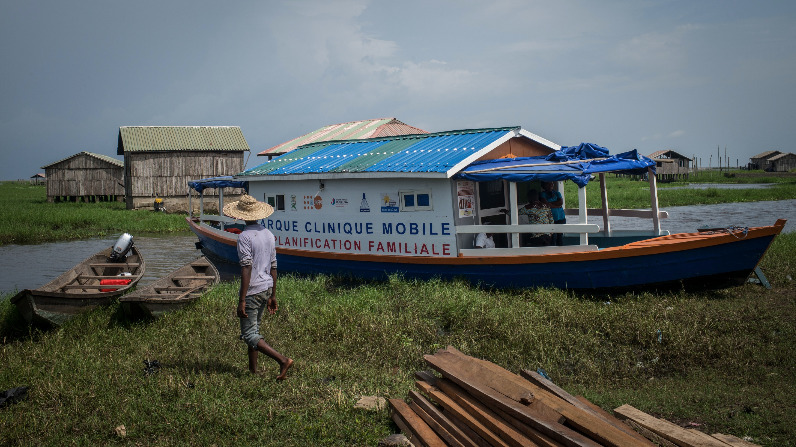
With the support of UNFPA and our partners, more women than ever before are using modern contraception. Fewer are dying in childbirth. More girls are able to stay in school and out of child marriage.
Yet, we still have a long way to go to get to zero. This means stepping up our efforts, innovation for scale, and expanding our partnerships to expand our reach.
We know how urgent it is to do so. We call our three overarching results “transformative” for a reason. They have the power to transform the individual lives of women and girls, but they will also transform communities and our world. Empowering women powers sustainable development. And it starts with empowering them to decide whether or when to have children. That is why sexual and reproductive health and rights are a key linchpin of the Sustainable Development Goals.
I am very happy that the Board had a chance, during your joint field visits to Uganda and to Haiti, to see UNFPA’s transformative work in action, and to see how we and our United Nations partners are delivering as one across the humanitarian-development continuum. I am glad that I was able to join you in Haiti, and I hope to have the chance to do so again in the future. That itself is an innovation.
I have always said seeing is believing in this world of infinite possibility.
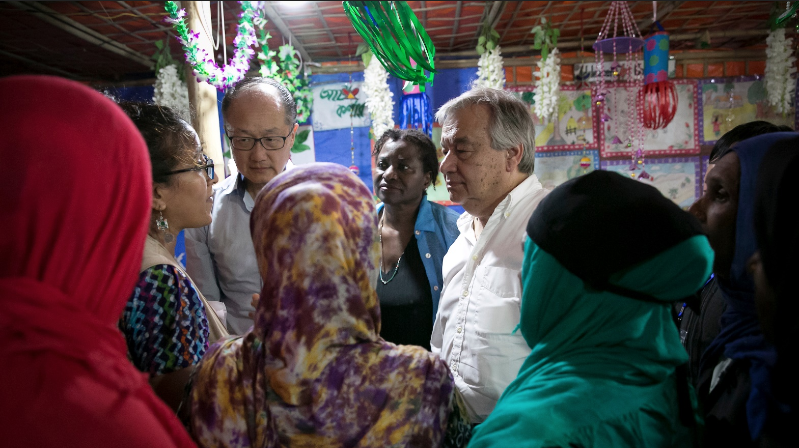
Having visited Bangladesh twice in the past few months, including most recently with UN Secretary-General António Guterres, the High Commissioner for Refugees and the World Bank President, I have been deeply moved by the stories and experiences of Rohingya women and girls – and inspired by their resilience and by work that the Government of Bangladesh and our humanitarian teams are doing on the ground to respond to the crisis.
We witnessed firsthand the heightened hardship and risks brought on by the monsoon season.
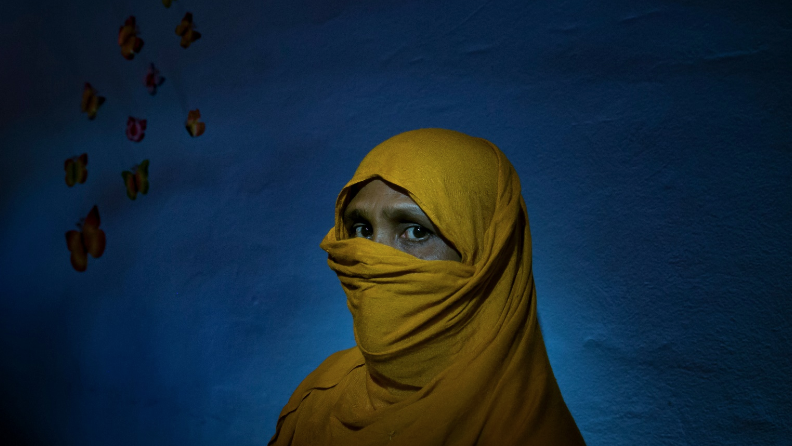
We heard stories of trauma and suffering from women at a UNFPA safe space.
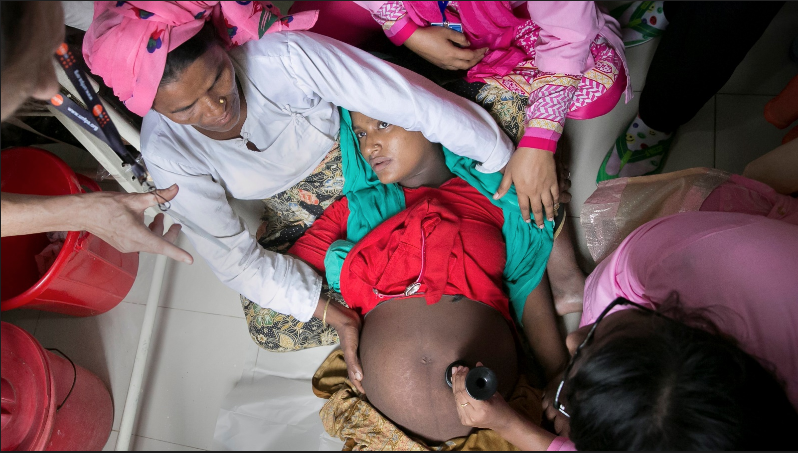
And we visited UNFPA-supported health facilities providing life-saving services to ensure safe birth – even here.
I accompanied Deputy Secretary-General Amina Mohammed and African Union representatives on a joint mission to South Sudan. We highlighted women’s participation and leadership in peace, security and development.
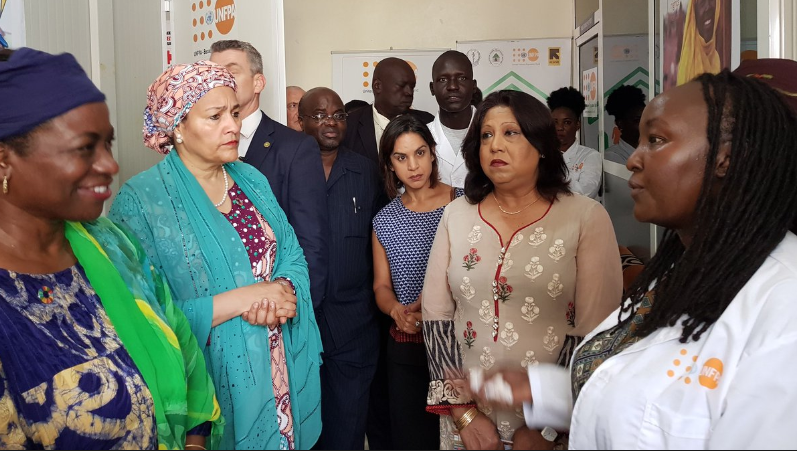
With violence against women at epidemic proportions, and sexual violence often used as a weapon of war, UNFPA-supported one-stop care centres like this one in Juba are a lifeline for survivors of violence – a place they can go for integrated medical, psychosocial, legal and other support services, all under one roof.
The theme of leaving no one behind and reaching those furthest behind resonated throughout two conferences that I attended in July.
At the International AIDS conference in the Netherlands, UNFPA with our partners launched a Call to Action for linking sexual and reproductive health and rights and HIV prevention, treatment and care. This will move us closer to our shared vision of universal health coverage, universal human rights and an end to the AIDS epidemic by 2030.
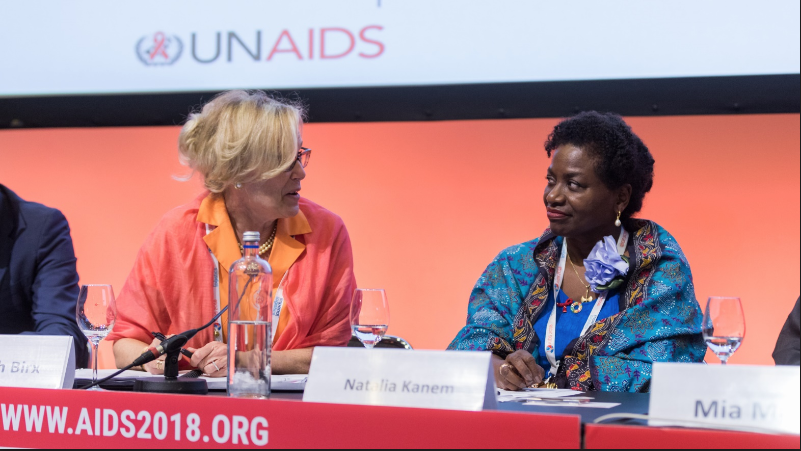
We have achieved undeniable progress in tackling HIV and AIDS. Yet we need to do more and we need to do it better. As co-lead with UNAIDS of the AIDS Prevention Coalition, UNFPA is working with governments, communities and partners. We are scaling up prevention efforts in the most-affected communities and populations, including among adolescent girls in Southern Africa who continue to face high rates of HIV infection.
At the Global Disability Summit in London, I participated in a session on the sexual and reproductive health and rights of persons with disabilities – a subject too often overlooked and neglected. Leaving no one behind means that everyone everywhere, including those who are differently abled, should be fully aware of and able to exercise their rights to a happy, healthy sexuality. Our new strategic plan and the 2030 Agenda compel us to ensure that they can.
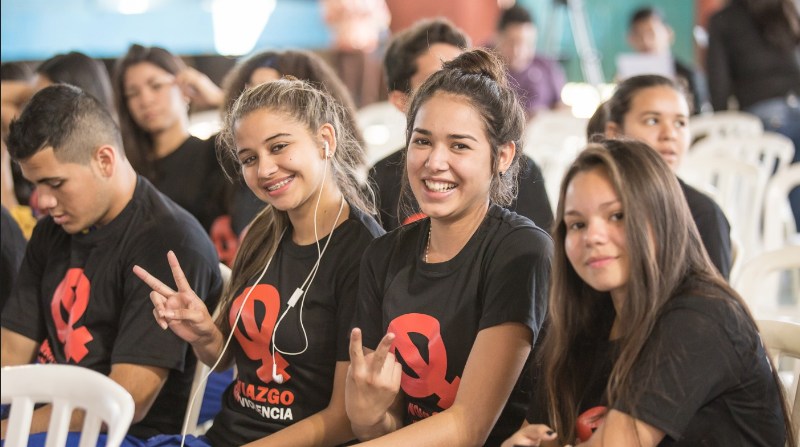
This is also at the heart of our work with and for young people. With UNICEF and other partners, we are committed to ensuring that young people’s voices are heard, that their rights are respected and that they have a legitimate seat at the table. UNFPA brings to these efforts decades of experience in supporting youth participation and engagement as well as the sexual and reproductive health and rights of young people.
That 10-year-old girl and millions of young people around the world are waiting to claim their rights, to be counted, to realize their potential. The launch later this month of the Secretary-General’s new UN youth strategy to guide system-wide work with and for young people is a collective step in the right direction.
UN Reform
Madam President,
As the Secretary-General said earlier this year in speaking about UN reform: “We have chosen the path of ambition.”
UNFPA has championed and is fully committed to the ambitious UN reform agenda endorsed by Member States. Operational collaboration and coordination with the rest of the UN system and with other stakeholders have always been the natural modus operandi of UNFPA. The resolution is an opportunity to do more, and UNFPA is leading by example in a number of areas to improve UN system-wide coherence and collaboration.
As you know, UNFPA was entrusted to lead the UN Sustainable Development Group’s Strategic Financing Results Group, together with UNCTAD. This group supports countries in shifting from funding individual projects to financing transformative change. To enable this transition, we are creating a knowledge and research hub on Sustainable Development Goal financing. We are building the financial literacy of staff, and developing principles for engagement and a UN financial data standard for reporting.
As an organization with a business model for differentiated country support, UNFPA has offered our expertise in the area of development of country-presence modalities for the new generation of UN Country Teams.
The transition team has asked our Deputy Executive Director (Management) Laura Londén, in partnership with UNESCO, to co-chair the UNDAF design team, and we are keen to move this process forward.
UNFPA is among the top three agencies, and on a par with UNDP, in leading on joint efforts to support national statistical capacities.
We are also providing leadership on multiplier goals, such as good health and well-being and gender equality, which have the potential to trigger improvements across multiple Sustainable Development Goals at once.
We will be briefing the Board in greater detail on the implications of UN reform for UNFPA at the informal session this afternoon, but I would like now to reiterate our strong commitment to the new Resident Coordinator system and to supporting its implementation.
Integrated Budget
Madam President,
Distinguished Delegates,
Today, we will discuss the proposed revision of the UNFPA integrated budget for 2018-2021 – the foundation for the transformations we strive to achieve.
We thank the Board for your vigorous engagement and inputs during our discussions on the budget. At your request, we have reflected the results of the comprehensive resources review in the revised budget proposal that you have before you.
We have heard your call for increased efficiency and improved balance between the institutional budget and programmes, and we are grateful for your recognition of our efforts in this regard during the annual session in June. We have also received a positive report from the Advisory Committee on Administrative and Budgetary Questions (ACABQ).
I am pleased to report that we are progressing with the implementation of our change management process, including the outcomes of the comprehensive resources review undertaken as part of the budget submission exercise.
As promised, we are putting in place a new architecture to ensure a more robust and coherent corporate approach to intergovernmental and inter-agency processes, including in the context of UN reform.
In line with that vision, one of the key measures we have taken is to establish a dedicated branch within a revamped Policy and Strategy Division, formerly known as the Programme Division. Work is ongoing to finalize the terms of reference for the new branch and accompanying job descriptions, and we are doing so in an open and consultative manner with staff.
And as highlighted in the vision shared with you last June, the Executive Board Branch now sits within the Office of the Executive Director.
We are redeploying resources away from Headquarters, towards countries and regions, to ensure that our technical support is ever closer to those we serve.
To respond to an increasingly complex and growing set of humanitarian needs in an effective and accountable way, we are implementing a new architecture for our humanitarian affairs. This will include retaining certain capacities at Headquarters, coupled with establishing a Humanitarian Office in Geneva.
Our dedicated objective is to bolster and scale up our humanitarian response, ensure preparedness and resilience across all institutional work streams, and further reinforce the call of Agenda 2030 for the UN to deliver across the nexus of humanitarian, peace and sustainable development.
Sadly, the need for our humanitarian interventions across the globe increases day by day by day. We will continue to rely on the political impetus from, and generous support of, Member States in this critical endeavor, and will engage with you as we move forward.
Change is a constant. As we work to ensure that UNFPA is equipped to deliver more and deliver better, new projects will be launched in the fall under the overall change management umbrella to look systemically at the way we are structured, the way UNFPA works and the systems UNFPA has in place to implement our Strategic Plan. This includes looking at our corporate culture to ensure that changes are cemented and make our organization stronger in the long term.
This is an ambitious process, and every effort is being made to ensure harmonization among the various change initiatives and with major external change drivers, such as the reform of the UN Development System.
The Operational Effectiveness and Efficiency outputs in the Strategic Plan provide the framework for key institutional changes to make UNFPA even more results-oriented, more agile and more innovative. This is the fit-for-purpose UNFPA that we envision, equipped and positioned to deliver on our Strategic Plan and the 2030 Agenda.
The corrigendum to the revised Integrated Budget reflects the strategic repositioning in intergovernmental and multilateral affairs, as well as our efforts to strengthen our humanitarian response. Let me add that these changes are budget neutral.
The document does, however, include the doubling of the cost-sharing agreement for funding of the Resident Coordinator system. In keeping with the GA resolution, UNFPA proposes an increase of US$7.1 million to the institutional budget, which is a doubled cost share for three years (2019-2021).
This increases the institutional budget revision from US$701.1 million to US$708.2 million for 2018-2021, which is still lower, however, than the originally approved budget of $708.4 million.
Funding
UNFPA continues to navigate a difficult funding environment. While we are surrounded by great uncertainty and multiple challenges, we have made the most of opportunities to build new support. I wish to sincerely thank the governments and other partners who continue to support our life-saving work. In order to reach the targets agreed in our Strategic Plan, we need all hands on deck.
UNFPA 2017 contribution revenue for regular and co-financing resources was over US$1 billion, or an increase of 27 per cent from 2016.
Ensuring predictable regular resources, core funding, continues to be UNFPA’s biggest challenge. The loss of annual funding of US$31 million from one of our top donors was a big blow. Yet key donors stepped up to cover the gap, resulting in a drop of just US$3 million in core resources last year – for which we are most grateful. That said, we have seen a decrease this year in governments supporting UNFPA with core resources – and we are far from our target of 150 donors. We appeal to all governments to stand up and be counted as a supporter of UNFPA.
While we have not yet closed the funding gaps for this year’s core and co-financing targets, we would like to acknowledge several Member States who have increased core contributions for 2018 – including China, Italy, New Zealand, Norway and Sweden.
Some donors, including Belgium, Denmark, Sweden and Switzerland, have responded to our appeal for multi-year agreements and have committed new core funds for next year and beyond. For all of this, we are immensely grateful, as we are to the 44 programme countries that have contributed to core resources for 2018. Still, without more commitments to multi-year funding, we risk serious predictability and implementation challenges. Later this week, we will discuss efforts to address this through the UNFPA Funding Compact.
Ensuring high-quality co-financing is also a priority. As mentioned to you in June, we have created a new Humanitarian-Action Thematic Fund to enhance donor contributions to our rapidly growing humanitarian work. It joins our thematic funds on commodity security and maternal health – all priority areas for us.
Overall, UNFPA is very active both at the global and at the country level in trying to adapt to the new development funding landscape and to adopt new measures to finance sustainable development.
We are working to build stronger partnerships with non-traditional donors and the UN System. These efforts yielded over US$23 million in 2017 – a 68 per cent increase over 2016. Initial results for the first half of this year are already showing US$10 million in contributions from corporations and foundations. And we will persevere.
UNFPA currently surpasses the required 15 per cent allocation of non-core resources to joint activities. We continue to strengthen our partnerships, particularly with National and International Financial Institutions, to support programme countries.
Given the current funding situation, we have based the Strategic Plan and Integrated Budget upon conservative income projections. Our funding targets remain ambitious, however, and we will continue to aggressively pursue opportunities to mobilize further resources.
The structured funding dialogues are our main channel for engaging with you on our funding situation throughout the year. We have been pleased with Member States’ consistent engagement so far and trust that the Executive Board will endorse our proposal to enhance the regularity and depth of our future interactions.
I am excited to announce today that Egypt and Sweden have agreed to co-champion the UNFPA structured funding dialogues. I thank them for taking on the important role of building support for UNFPA, and rallying Member States around the realization of the UNFPA funding compact and the strengthening of our funding architecture.
Madam President,
The poet Maya Angelou once said, “Nothing can dim the light which shines from within.” At UNFPA, that light is the dedication and compassion of our people. This is what drives our results. As we transform our organization in response to evolving needs, nurturing that light is crucial. Staff well-being is a top priority. This is a time of change and empowerment of UNFPA staff, from within.
Any form of workplace harassment or abuse of authority has no place at UNFPA. We have zero tolerance for all forms of sexual misconduct, be it sexual harassment committed towards a coworker or sexual exploitation and abuse perpetrated against those we serve.
We continue to strengthen our capacity to prevent and to respond to all such abuses and are working closely with other agencies, funds and programmes to improve the UN-wide response at all levels. UNFPA has a track record of swift action, when warranted, which we will vigorously continue.
I have appointed a dedicated coordinator for protection from sexual exploitation and abuse and sexual harassment. Already, she is working with Laura Londén, Deputy Executive Director (Management), and our senior focal point on these issues, to roll out a coherent, comprehensive strategy to effectively prevent and respond to sexual misconduct.
We are revising our Harassment Policy to strengthen the rights and the recourse of those affected by sexual harassment. Among other changes, the new policy will eliminate time limits for reporting and allow for third-party and anonymous reporting.
With respect to sexual exploitation and abuse, we have introduced improved pre-employment screening of personnel to prevent re-hiring of known offenders.
We have revised contract agreements with implementing partners to ensure that those we are working with have the capacity to prevent and respond to sexual exploitation and abuse.
And, in collaboration with UN Victims’ Rights Advocate and the Special Representative of the Secretary-General on Sexual Violence in Conflict, we are mapping local capacities to assist and support victims of sexual exploitation and abuse.
I will hold a UNFPA town hall meeting with all staff this Thursday, 6 September, to discuss these and other issues. We will also update staff on the latest developments in the change management process, including the implementation of the comprehensive resources review, and brief them on preparations for next year’s ICPD+25 and UNFPA@50 celebrations.
Madam President,
Much has changed since 1994. UNFPA is changing. The UN system is changing. The world has changed dramatically.
Yet, we hold fast to our core values. We hold fast to our commitment to the ICPD agenda and to our firm belief that sexual and reproductive health and reproductive rights are a cornerstone of sustainable development.
We are transforming our organization to achieve greater results and impact and to leave no one behind.
With our partners, we are transforming the UN system to deliver more efficiently and effectively together.
And we are transforming the lives of women and girls, men and boys, so that, equipped with choices and able to exercise their rights, they can transform our world.
For 50 years, UNFPA has responded to challenges that threaten those rights and those choices and we have capitalized on opportunities to advance them.
As a result, today more women have the means to decide if and when they become pregnant and to chart the course of their own lives.
That is the power of choice. It can rapidly improve the wellbeing of women and girls, transform families and societies, and accelerate global development.
World leaders meeting in Cairo in 1994 understood this when they adopted the ICPD Programme of Action. The global community understood this when they made reproductive health and rights a specific aim of the 2030 agenda. We at UNFPA have known this for years.
Choice can change the world. Women and girls deserve nothing less.
And they are waiting…That 10-year-old girl is waiting…She is waiting to claim her place and her power and to fulfill her potential. With the appropriate knowledge, services and support, with our support, she will come to understand her body well, to know that she decides and that she is always to be fully respected by everyone – boys, men, other girls and women.
The promise of ICPD+25 next year is to stand strong for her, to keep moving forward until these fundamental rights and choices are a reality for every woman and girl – everywhere.
With your continued support, I know that we will.
Thank you.